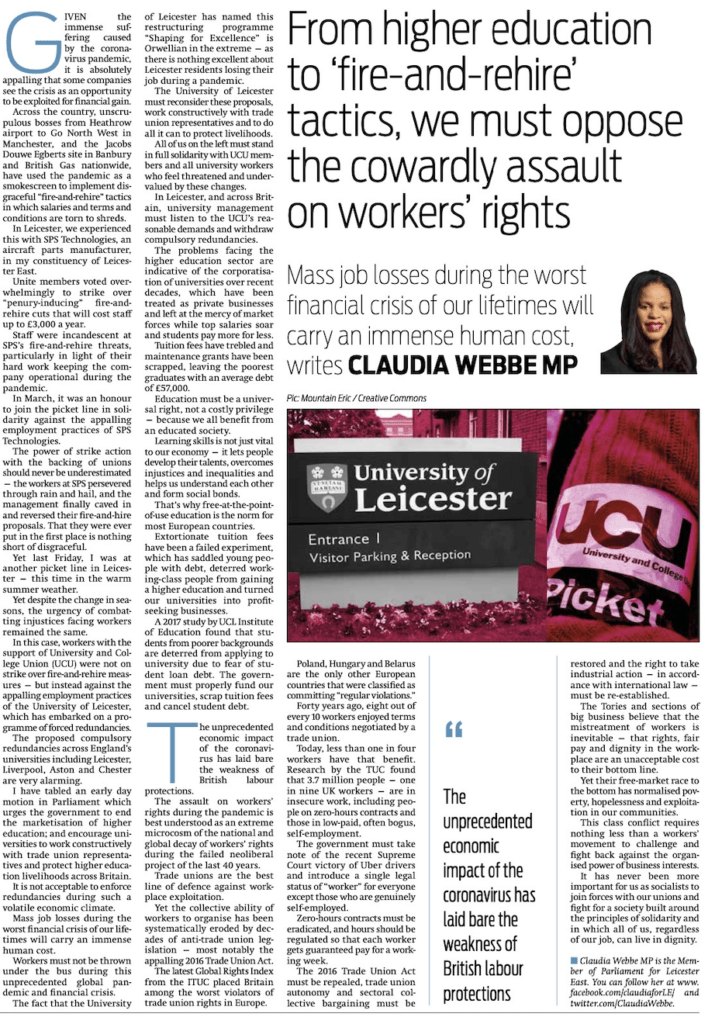From higher education to ‘fire-and-rehire’ tactics, we must oppose the cowardly assault on workers’ rights
By Claudia Webbe MP
Mass job losses during the worst financial crisis of our lifetimes will carry an immense human cost, write CLAUDIA WEBBE MP
GIVEN the immense suffering caused by the coronavirus pandemic, it is absolutely appalling that some companies see the crisis as an opportunity to be exploited for financial gain.
Across the country, unscrupulous bosses from Heathrow airport to Go North West in Manchester, and the Jacobs Douwe Egberts site in Banbury and British Gas nationwide, have used the pandemic as a smokescreen to implement disgraceful “fire-and-rehire” tactics in which salaries and terms and conditions are torn to shreds.
In Leicester, we experienced this with SPS Technologies, an aircraft parts manufacturer, in my constituency of Leicester East.
Unite members voted overwhelmingly to strike over “penury-inducing” fire-and-rehire cuts that will cost staff up to £3,000 a year.
Staff were incandescent at SPS’s fire-and-rehire threats, particularly in light of their hard work keeping the company operational during the pandemic.
In March, it was an honour to join the picket line in solidarity against the appalling employment practices of SPS Technologies.
The power of strike action with the backing of unions should never be underestimated — the workers at SPS persevered through rain and hail, and the management finally caved in and reversed their fire-and-hire proposals. That they were ever put in the first place is nothing short of disgraceful.
Yet last Friday, I was at another picket line in Leicester — this time in the warm summer weather.
Yet despite the change in seasons, the urgency of combatting injustices facing workers remained the same.
In this case, workers with the support of University and College Union (UCU) were not on strike over fire-and-rehire measures — but instead against the appalling employment practices of the University of Leicester, which has embarked on a programme of forced redundancies.
The proposed compulsory redundancies across England’s universities including Leicester, Liverpool, Aston and Chester are very alarming.
I have tabled an early day motion in Parliament which urges the government to end the marketisation of higher education; and encourage universities to work constructively with trade union representatives and protect higher education livelihoods across Britain.
It is not acceptable to enforce redundancies during such a volatile economic climate.
Mass job losses during the worst financial crisis of our lifetimes will carry an immense human cost.
Workers must not be thrown under the bus during this unprecedented global pandemic and financial crisis.
The fact that the University of Leicester has named this restructuring programme “Shaping for Excellence” is Orwellian in the extreme — as there is nothing excellent about Leicester residents losing their job during a pandemic.
The University of Leicester must reconsider these proposals, work constructively with trade union representatives and to do all it can to protect livelihoods.
All of us on the left must stand in full solidarity with UCU members and all university workers who feel threatened and undervalued by these changes.
In Leicester, and across Britain, university management must listen to the UCU’s reasonable demands and withdraw compulsory redundancies.
The problems facing the higher education sector are indicative of the corporatisation of universities over recent decades, which have been treated as private businesses and left at the mercy of market forces while top salaries soar and students pay more for less.
Tuition fees have trebled and maintenance grants have been scrapped, leaving the poorest graduates with an average debt of £57,000.
Education must be a universal right, not a costly privilege — because we all benefit from an educated society.
Learning skills is not just vital to our economy — it lets people develop their talents, overcomes injustices and inequalities and helps us understand each other and form social bonds.
That’s why free-at-the-point-of-use education is the norm for most European countries.
Extortionate tuition fees have been a failed experiment, which has saddled young people with debt, deterred working-class people from gaining a higher education and turned our universities into profit-seeking businesses.
A 2017 study by UCL Institute of Education found that students from poorer backgrounds are deterred from applying to university due to fear of student loan debt.
The government must properly fund our universities, scrap tuition fees and cancel student debt.
The unprecedented economic impact of the coronavirus has laid bare the weakness of British labour protections.
The assault on workers’ rights during the pandemic is best understood as an extreme microcosm of the national and global decay of workers’ rights during the failed neoliberal project of the last 40 years.
Trade unions are the best line of defence against workplace exploitation.
Yet the collective ability of workers to organise has been systematically eroded by decades of anti-trade union legislation — most notably the appalling 2016 Trade Union Act.
The latest Global Rights Index from the ITUC placed Britain among the worst violators of trade union rights in Europe.
Poland, Hungary and Belarus are the only other European countries that were classified as committing “regular violations.”
Forty years ago, eight out of every 10 workers enjoyed terms and conditions negotiated by a trade union.
Today, less than one in four workers have that benefit. Research by the TUC found that 3.7 million people — one in nine UK workers — are in insecure work, including people on zero-hours contracts and those in low-paid, often bogus, self-employment.
The government must take note of the recent Supreme Court victory of Uber drivers and introduce a single legal status of “worker” for everyone except those who are genuinely self-employed.
Zero-hours contracts must be eradicated, and hours should be regulated so that each worker gets guaranteed pay for a working week.
The 2016 Trade Union Act must be repealed, trade union autonomy and sectoral collective bargaining must be restored and the right to take industrial action — in accordance with international law — must be re-established.
The Tories and sections of big business believe that the mistreatment of workers is inevitable — that rights, fair pay and dignity in the workplace are an unacceptable cost to their bottom line.
Yet their free-market race to the bottom has normalised poverty, hopelessness and exploitation in our communities.
This class conflict requires nothing less than a workers’ movement to challenge and fight back against the organised power of business interests.
It has never been more important for us as socialists to join forces with our unions and fight for a society built around the principles of solidarity and in which all of us, regardless of our job, can live in dignity.
Claudia Webbe MP is the member of Parliament for Leicester East. You can follow her at www.facebook.com/claudiaforLE and twitter.com/ClaudiaWebbe



